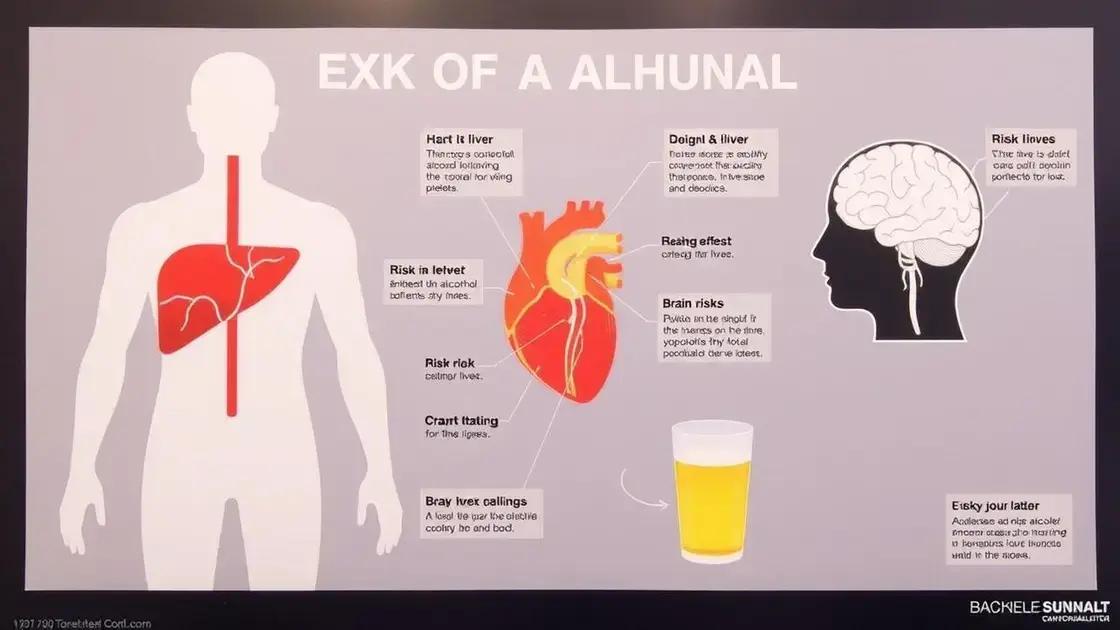The importance of limiting alcohol for better overall health includes benefits like improved physical health, enhanced mental well-being, and increased energy. Practical tips for achieving this include setting clear goals, choosing alcohol-free days, and utilizing resources like support groups and mobile apps for tracking progress.
Understanding the importance of limiting alcohol for better overall health is crucial in today’s fast-paced world. Excessive alcohol consumption can lead to serious health issues, including liver disease, heart problems, and mental health disorders. By exploring its effects and benefits, we can encourage healthier choices and promote well-being. In this article, we’ll discuss the impact of alcohol on health, practical tips to reduce intake, and resources that offer support and guidance.
Understanding Alcohol’s Impact on Health

Understanding the Connection Between Alcohol and Health
Alcohol can have both short-term and long-term effects on our health. When consumed in moderation, it may fit into a balanced lifestyle. However, excessive drinking can lead to serious health issues.
Short-Term Effects
In the short term, drinking alcohol can impair judgment, coordination, and reaction times. This can lead to accidents or risky behaviors. Some immediate effects of heavy drinking include:
- Nausea and vomiting
- Blackouts and memory lapses
- Alcohol poisoning
Long-Term Effects
Long-term alcohol consumption can cause chronic health problems. Some serious effects include:
- Liver Damage: Alcohol can harm the liver and lead to cirrhosis.
- Heart Problems: Heavy drinking increases the risk of high blood pressure and heart disease.
- Mental Health Issues: Alcohol can worsen anxiety and depression.
The Risks of Alcohol Dependency
One major concern is alcohol dependency. Regular heavy drinking can lead to addiction, where the body becomes reliant on alcohol to function. Recognizing the signs of alcohol dependency is critical for personal health and well-being.
By understanding the impact of alcohol on health, individuals can make informed decisions about their drinking habits. This awareness is a key step in achieving better overall health.
Benefits of Reducing Alcohol Consumption

Reducing alcohol consumption offers numerous benefits for both physical and mental health. Making this positive change can lead to a better quality of life.
Improved Physical Health
One of the most significant benefits of reducing alcohol is improved physical health. Fewer drinks can lead to:
- Better Liver Function: The liver can recover from damage caused by excessive drinking.
- Weight Loss: Alcohol is high in calories, and cutting back can help maintain or achieve a healthier weight.
- Stronger Heart: Reducing alcohol reduces the risk of developing heart disease.
Enhanced Mental Well-Being
Reducing alcohol also positively impacts mental health. Some improvements include:
- Decreased Anxiety and Depression: Many people experience reduced levels of anxiety and better mood stability.
- Better Sleep: Less alcohol can lead to improved sleep quality, which enhances overall mental clarity.
Increased Energy Levels
When alcohol intake is lowered, people often notice a boost in their energy levels. This increased energy can lead to:
- More Physical Activity: With more energy, individuals may exercise more and engage in outdoor activities.
- Enhanced Productivity: Reduced fatigue means people can focus better at work and home.
Embracing a lifestyle with less alcohol can lead to a happier, healthier life.
Practical Tips for Limiting Alcohol Intake

Limiting alcohol intake can be challenging, but with practical tips, it becomes more manageable. Here are some simple yet effective strategies to consider:
Set Clear Goals
Decide how much you want to cut back. Setting specific, measurable goals can help you stay focused. For example, aim for a certain number of alcohol-free days each week.
Choose Alcohol-Free Days
Designate specific days where you will not drink at all. This can help create a routine and reduce overall consumption.
Find Alternatives
Replace alcoholic drinks with non-alcoholic options. Sparkling water, herbal tea, or non-alcoholic beer can provide satisfying flavors without the alcohol.
Be Mindful of Triggers
Identify situations that prompt you to drink, such as parties or stressful events. Being aware of these triggers can help you avoid them or prepare coping strategies.
Practice Saying No
Prepare to decline offers for drinks politely. You can say, “No, thank you, I’m taking a break from alcohol.” Being confident in your decision makes it easier to stick to your limits.
Keep Track
Maintain a record of your drinking habits. This can help you see patterns and stay accountable to your goals. Apps or journals can assist in this process.
Seek Support
Involve family or friends in your journey. Having support makes it easier to stay committed to limiting alcohol. Share your goals with them, or join a group for added encouragement.
Resources for Support and Guidance

Finding resources for support and guidance can make a big difference when limiting alcohol consumption. Here are some useful options:
Support Groups
Joining a support group is a great way to connect with others facing similar challenges. Consider local groups or organizations like:
- Alcoholics Anonymous (AA): A worldwide fellowship that offers meetings and support.
- SMART Recovery: A self-help group focused on building motivation and coping skills.
Online Resources
Many websites offer helpful information and communities for support. Some recommend:
- National Institute on Alcohol Abuse and Alcoholism (NIAAA): Provides educational resources and links to treatment options.
- QuitAlcohol.com: Offers guidance, tips, and support for those wanting to reduce alcohol intake.
Apps for Tracking Progress
Utilizing mobile apps can help track your alcohol consumption and set goals. Some popular apps include:
- Drinkaware app: Helps track drinking habits and offers guidance.
- 天天淡酒 (Daybreak): Supports users in reducing their alcohol intake through tracking and community engagement.
Professional Counseling
If you’re seeking personalized help, consider speaking with a professional counselor or therapist. They can provide tailored strategies and emotional support to help you stay on track.
In conclusion, embracing a healthy approach to alcohol
The importance of limiting alcohol for better overall health cannot be understated. Understanding the implications of alcohol consumption can motivate positive changes.
By recognizing the impact of alcohol on health, individuals can enjoy the benefits of reducing their intake, including improved physical health, enhanced mental well-being, and increased energy levels.
Implementing practical strategies—such as setting clear goals, finding alternatives, and seeking support—can ease the process of limiting alcohol. Additionally, a variety of resources, including support groups and professional counseling, are available to provide guidance along the way.
Ultimately, choosing to limit alcohol can lead to a healthier lifestyle, and taking the first step may lead to lasting benefits for years to come.
FAQ – Frequently Asked Questions about Limiting Alcohol for Better Health
What are the benefits of limiting alcohol consumption?
Limiting alcohol can improve physical health, enhance mental well-being, and increase energy levels, leading to a better quality of life.
How can I start reducing my alcohol intake?
You can start by setting clear goals, choosing alcohol-free days, and finding alternatives for drinking.
What resources can help me limit my alcohol consumption?
Support groups, online resources, tracking apps, and professional counseling are excellent options to help you on your journey.
Are there any effective strategies for managing triggers?
Be mindful of situations that lead to drinking and use coping strategies, such as engaging in a hobby or spending time in alcohol-free environments.
How can support groups assist me in this process?
Support groups provide a community of people with similar experiences, offering encouragement, advice, and accountability.
What types of non-alcoholic alternatives can I try?
You can explore options like sparkling water, mocktails, herbal teas, and non-alcoholic beers as satisfying replacements.













